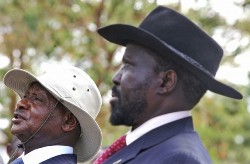South Sudan says Ugandan military support was “legitimate”
February 5, 2014 (JUBA) – The South Sudanese government has commended the military support provided by neighbouring Uganda, crediting it with helping quell a spiralling rebellion in the country.

“The friends who extend helping hands at the opportune time are the genuine friends. The assistances the government of the Republic of South Sudan received from the governments and people of Kenya and Uganda demonstrated the strength of relations we have with these countries”, interior minister Aleu Ayieny Aleu said in an address to the South Sudan police service.
“They have repeatedly shown this to us. In the first and the second war with Sudan, they stood by our side and provided necessary assistance in terms of hosting our people as refugees and in terms of provision of humanitarian aides and physical protection”, Aleu added.
SOUTH SUDAN NOT AN ISLAND
Flanked by the minister of defence, Kuol Manyang Juuk and the minister of security in the office of the president, Mabuto Mamur Mete, Aleu repeatedly referred to Uganda as “a genuine friend” of the South Sudanese people.
“Uganda would have provided the support it has provided this government even if it were someone else in power, especially if it is the democratically elected government by the people of this country”, Aleu told attendees at a joint security session on Monday in the capital, Juba.
“Uganda is a genuine friend and so their support is legitimate. South Sudan is not an island. We are part of the region and a conflict here affects them (neighbouring countries)”, Aleu added.
Mete, who also spoke at the same function, said the session had been called on behalf of the president who requested the three security officials to publicly acknowledge the role of the country’s security organs in helping quell unrest.
“Without you this country would have been thrown into anarchy. We have also come to remind you of the importance of our duties as provided in the constitution and to talk about unity within our ranks”, Mete said in a statement broadcast on South Sudan Television (SSTV).
Juuk said the unity within the police and the other organised forces, including the national army (SPLA), had helped prevent rebels from achieving their objectives.
Juuk echoed the statement of the interior minister that the military support from Uganda was completely legitimate, considering the level of threat rebel forces posed to national security.
“I think awareness of the threat posed by the rebels was quite strong and an intervention was within the bounds of the possible assistance”, Juuk said.
A senior intelligence officer from the SPLA told Sudan Tribune on Wednesday that a security assessment provided to the president, Salva Kiir, on 18 December, warmed that the army was too weak to singlehandedly quash the rebellion without outside support.
“It would have taken time for the government to contain this rebellion if we did not provide immediate information on the capability of the SPLA, especially after it became clear [there was] a mutiny”, the official said.
“We noticed that some sections of our forces were either not taking orders or joining the rebellion. We saw that in Mangat, Khor William and many other places on 16 and 17 December. Nobody was taking or giving orders”, he added.
Violence erupted in South Sudan on 15 December in Juba following clashes between rival tribe members within the presidential guards, with Kiir accusing former vice-president Riek Machar of masterminding an alleged coup attempt to overthrow the government.
Government forces loyal to Kiir, at times assisted by Ugandan troops, battled pro-Machar forces for control of strategic areas.
Debate has continued to rage about Uganda’s military intervention in the South Sudan conflict, with Machar’s rebel group accusing Ugandan troops of violating a peace deal signed on 23 January in the Ethiopian capital, Addis Ababa.
(ST)
